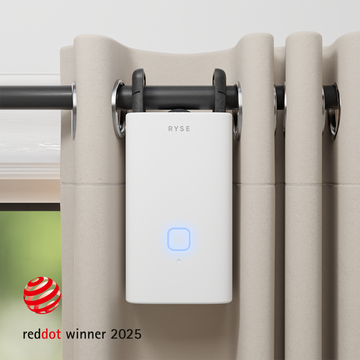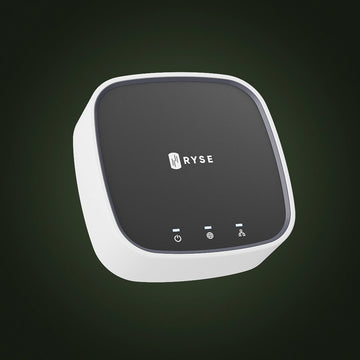What You’ll Learn
- How sleep deprivation can disrupt your mood, hormones, and brain activity
- The connection between alcohol, sleep, and your mental and physical health
- How controlling your environment, including light exposure, can improve sleep quality
- The benefits of smart solutions like RYSE SmartShade in optimizing your sleep habits
What Happens When You Sleep
Sleep isn’t just a time for rest — it’s when your body and brain reset. While you’re lying still, your brain is busy regulating emotions, balancing hormones, and filing away memories. But when you cut sleep short, even by an hour or two, that entire system starts to slip. You might notice you’re more irritable. Hungrier. Foggy. Less like yourself. That’s not just a coincidence — it’s biology.
In this article, we’ll explore how sleep (or the lack of it) affects your mood, hormones, and brain activity, and what you can do to get back on track.
Emotional Dysregulation
Sleep and emotional stability are tightly connected. When you’re sleep-deprived, your brain’s prefrontal cortex — the region responsible for rational thinking and emotional regulation — becomes less active. Meanwhile, the amygdala, your brain’s emotional reaction center, goes into overdrive.
As a result, your responses become more reactive and less measured. You might find yourself snapping over things you’d normally brush off, feeling more sensitive, or getting overwhelmed by minor stressors. Even your ability to empathize can take a hit.
After just one night of poor sleep, your emotional resilience drops. And over time, this can lead to patterns of irritability, anxiety, and even depressive symptoms, all driven by how your brain processes emotion when it’s running on low power.
Hormonal Imbalance
Sleep is one of the body’s most powerful hormonal regulators. Without it, your endocrine system goes off track. The imbalance starts with two key hormones that govern hunger:
- Ghrelin, the hormone that makes you feel hungry, increases.
-
Leptin, which signals fullness, decreases.
This means you’re more likely to crave calorie-dense foods and less likely to feel satisfied after eating. On top of that, your cortisol levels (the body’s main stress hormone) spike, making you feel wired and anxious, even if you’re exhausted.
The metabolic effects don’t stop there. Ongoing sleep loss contributes to insulin resistance, making it harder for your body to regulate blood sugar. Over time, this raises the risk of weight gain, prediabetes, and metabolic syndrome, all triggered or worsened by something as basic as not getting enough rest.
Cognitive Performance & Mental Clarity
Your brain uses sleep like a maintenance window. During deep sleep, it clears out waste proteins, files away memories, and resets neural pathways. But without enough rest, this process stalls.
You might notice:
- Trouble concentrating, even on simple tasks.
- Memory lapses, like forgetting names or why you walked into a room.
-
Slower reaction times and muddled thinking.
This mental fog isn’t just frustrating: it can be dangerous, especially when driving, working, or making decisions under pressure. Over time, chronic sleep deprivation is linked to reduced brain volume, impaired learning, and even long-term risks like Alzheimer’s and dementia.
Stress Resilience & Emotional Recovery
Sleep is your body’s natural reset button for stress. During deep sleep, your nervous system calms down, cortisol levels drop, and your body repairs itself, mentally and physically.
But when you’re not getting enough rest:
- Your stress response stays elevated, even when nothing is wrong.
- You’re more likely to feel on edge, anxious, or overstimulated.
-
Small inconveniences feel like big problems, and bouncing back takes longer.
Over time, chronic sleep loss can wear down your emotional resilience, making you more vulnerable to burnout, anxiety, and even depression. Rest isn’t just about feeling better — it’s about building the emotional capacity to handle whatever life throws your way.
One Last Thing: Light Pollution Might Be Sabotaging Your Sleep
It’s not just alcohol, caffeine, or stress that messes with your sleep: light plays a bigger role than most people realize.
Exposure to artificial light in the evening (especially blue light from screens or streetlights) suppresses melatonin, the hormone that helps you fall asleep. Even a dim glow through your window can shift your circadian rhythm, making it harder to fall and stay asleep.
Controlling your light environment is one of the most underrated ways to improve sleep quality.
That’s where smart tools come in. RYSE SmartShade lets you automate your window blinds or shades to close at sunset and open with the sunrise — no rewiring or renovation needed. You stay in rhythm with your natural body clock, without needing to think about it.
It’s easy to install, easy to use, and a small change that pays off every single night.
FAQ
How many hours of sleep do I really need?
Most adults need 7–9 hours of sleep each night for optimal health. Some people may function well with 6.5 hours, but anything under 6 hours on a regular basis can lead to noticeable negative effects on your mental and physical well-being.
Can I "catch up" on sleep over the weekend?
While catching up on sleep can help alleviate some sleep debt, it doesn’t fully reverse the effects of chronic sleep deprivation. Consistent, quality sleep is the key to maintaining good health in the long run.
Why am I more emotional when I’m tired?
Sleep deprivation affects your brain's emotional centers, making them more sensitive while also reducing the activity of your rational decision-making centers. This imbalance can result in increased irritability, mood swings, and overreaction to minor stressors.
How can light pollution impact my sleep quality?
Exposure to light during the evening interferes with your body’s natural circadian rhythm, making it harder for you to fall asleep and stay asleep. Artificial light, especially blue light, suppresses melatonin production and delays sleep onset. By reducing light pollution in your bedroom, you can significantly improve your sleep quality.
How can RYSE help me improve my sleep quality?
RYSE SmartShade is a simple and effective solution to control light pollution in your home. By adjusting your blinds based on the time of day or your sleep schedule, you can create a darker, more restful environment that promotes better sleep. Its easy installation and robust design ensure effortless usage and long-term comfort.







